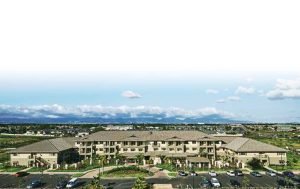
When a loved one shows the first signs of dementia or is diagnosed with Alzheimer’s disease, it can feel overwhelming. Getting early, quality care is crucial for maximizing their well-being, but knowing where to start is a challenge for many families.
A support system is an important first step. Senior living communities often embrace neighborhood outreach services and resources. Working together with organizations such as the Alzheimer’s Association of Hawai‘i provides a supportive network for local families through open community meetings. A nearby group can help navigate the emotional journey ahead.
The next step is having an understanding that almost all ku¯ puna with memory loss will eventually need continuous care. Memory Care is a specialized service. Not all senior living communities are able to offer it, but it is important to find one that is licensed to do so. Studies show that staff trained specifically in dementia care can provide better quality of life for residents.
What to Look for in a Memory Care Home
Spectrum of Support: When researching senior living communities, find out if there’s a supportive bridge to Memory Care available for earlystage patients. Minimizing disruption is beneficial to those requiring memory support.
Body & Mind: A connection between physical and mental well-being is well documented. Make sure the community offers physical activities that can be tailored to the individual to keep them vital.

Security & Serenity: Secure grounds are paramount to the safety of residents and the peace of mind for ‘ohana. As wandering is a common occurrence in seniors with memory loss, ask about the safety measures in place. A protected natural setting is also an ideal addition, such as a place offering stimulation in a reassuring space.
Making “Connections:” An important part of the memory support for residents is a program encouraging social interaction. Seek a community that provides daily programs that engage residents. Music therapy can also be a powerful enhancement. People process music with almost every part of their brain and music that has personal significance can garner responses even in seniors with later stages of dementia.
Care with Compassion: In addition to quality training and good staff-to-resident ratios, there should be a philosophy of service delivered with dignity. Great memory care engages ku¯ puna, gives them space to be active and promotes a complete package of physical and emotional support.
‘ILIMA AT LEIHANO
739 Leihano St., Kapolei HI 96707
808-674-8022 | www.kiscoseniorliving.com


Leave a Reply